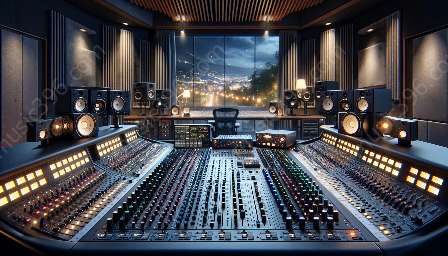Sound waves are an integral part of the science of sound waves and play a crucial role in sound engineering. Understanding the fundamental principles of sound waves is essential for comprehending their behavior and applications. In this comprehensive guide, we will explore the basic principles of sound waves, their significance in the science of sound waves, and their relevance in sound engineering.
The Basics of Sound Waves
What are Sound Waves?
Sound waves are mechanical waves that travel through a medium, such as air, water, or solids, as a series of compressions and rarefactions. These waves are caused by the vibration of particles in the medium, which creates changes in pressure that propagate as sound.
Properties of Sound Waves
Sound waves exhibit various properties, including frequency, wavelength, amplitude, and speed. The frequency of a sound wave determines its pitch, while the amplitude determines its loudness. Wavelength is the distance between two successive points in a wave that are in the same phase, and the speed of sound waves depends on the medium through which they travel.
Significance in the Science of Sound Waves
Understanding the fundamental principles of sound waves is crucial in the science of sound waves, also known as acoustics. Acoustics is the interdisciplinary science that deals with the study of mechanical waves in gases, liquids, and solids, including sound waves. The study of sound waves encompasses a wide range of topics, including wave propagation, resonance, and the perception of sound.
Wave Propagation
The study of sound waves involves understanding how they propagate through different mediums. This includes the interaction of sound waves with boundaries, reflections, and refractions, which are essential concepts in the science of sound waves. Understanding wave propagation is fundamental in various fields, including music, architecture, and industrial noise control.
Resonance and Vibration
Sound waves play a significant role in the phenomena of resonance and vibration. Resonance occurs when an object is subjected to external vibrations at its natural frequency, leading to amplified oscillations. The study of resonance is critical in musical instruments, architectural design, and structural engineering, all of which rely on an understanding of sound waves and their behavior.
Psychoacoustics
Psychoacoustics is the study of how humans perceive and interpret sound. This field explores the psychological and physiological responses to sound waves, including the perception of pitch, loudness, and timbre. The science of sound waves delves into the complex interactions between sound waves and the human auditory system, providing insight into the design of audio technologies and environments.
Role in Sound Engineering
Sound engineering revolves around the manipulation and control of sound waves to achieve desired outcomes in various applications. Whether in music production, live sound reinforcement, or acoustical design, sound engineers rely on the fundamental principles of sound waves to shape and optimize sonic experiences.
Sound Reproduction and Recording
One of the primary roles of sound engineering is in sound reproduction and recording. Understanding how sound waves interact with microphones, speakers, and recording equipment is essential for capturing and reproducing audio with fidelity and accuracy. Sound engineers utilize their knowledge of sound wave principles to achieve high-quality recordings and immersive listening experiences.
Acoustical Design
Architectural acoustics is a specialized field of sound engineering that involves the design of spaces to optimize sound quality and speech intelligibility. Sound engineers use their understanding of sound wave behavior to control reflections, reverberation, and diffusion within spaces such as concert halls, theaters, and recording studios, creating optimal acoustic environments for performers and audiences.
Sound Reinforcement
In live sound reinforcement, sound engineers manipulate sound waves to ensure optimal coverage and clarity in venues ranging from small clubs to large arenas. This involves the use of speaker placement, signal processing, and acoustical analysis to deliver balanced and impactful sound for live performances. Understanding the behavior of sound waves in different environments is crucial for achieving consistent and high-quality sound reinforcement.
Conclusion
Sound waves are fundamental in both the science of sound waves and sound engineering, influencing various aspects of our lives, from music to communication and beyond. By understanding the basic principles of sound waves and their significance in these domains, we can appreciate the intricate nature of sound and harness its potential for creative and practical applications.


























